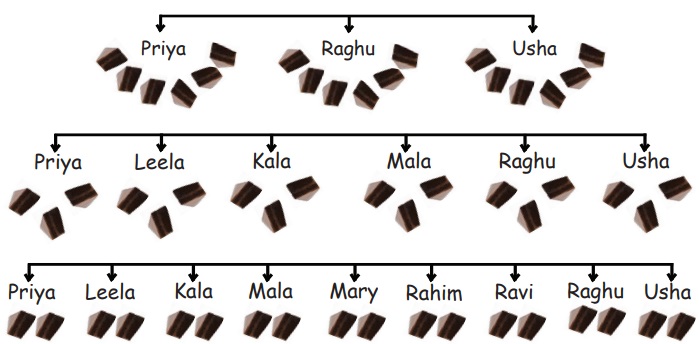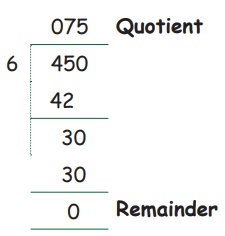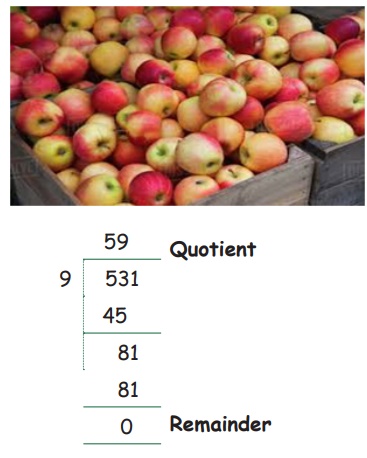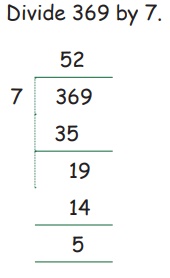Numbers | Term 3 Chapter 2 | 4th Maths - Division: (up to 4 digit number by single digit number) | 4th Maths : Term 3 Unit 2 : Numbers
Chapter: 4th Maths : Term 3 Unit 2 : Numbers
Division: (up to 4 digit number by single digit number)
UNIT−2
NUMBERS

Division:
(up to 4 digit number by single digit number)
To
divide a given number by another number in various ways.
There are many ways to divide a
given number by another number. They are
(i) Equal sharing
(ii) Equal grouping
(iii) Repeated subtraction
(iv) Long division
(v) Short division
You have learnt already the type
of divisions in previous class. Now we are going to see Equal sharing and short
division.
(i) Equal sharing
Priya wants to celebrate her birthday along with her Parents Raghu and Usha. Her father bought a cake for her. She makes the cake into 18 pieces and wants to divide it equally along with her parents, each of them got 6 pieces. At that time her friends Leela, Kala and Mala has come with their gifts. So, she wants to share the cake with her friends also, each of them got 3 pieces. After a few minutes three of her father and mother's friends Mary, Rahim and Ravi has come for the party. Now she has decided to share the cake with them also. How much share would all get in total ?

Each gets 2 pieces of cake. Thus
18 pieces of cake is shared equally among 9 members with 2 pieces each.
Note: In division, equal sharing leaves remainder also.
(v) Short division
Divide 670 ÷ 5
Here 670 is the dividend,
5 is the divisor
Note: Superscript means placing
the number in the right side top of the given number as small. e.g. 32,63
Here, 5(the divisor) divides
6(the first digit of the dividend) in 1 time, with the reminder of 1, place the
quotient 1, above the long division bar. Place as small superscript 1 beside 6.

Combine it with the next dividend
digit to the right. Now find out how many times the divisor divides the new two
digit number 11. The divisor divides 11, 3 times, with the remainder of 2,
place the quotient 3 above the division line, 2 as the superscript beside 7.

Now consider the last term of the
dividend combine the remainder with next dividend to the right. We get a new 2
digit number 20. The divisor 5 divides 20, 4 times. Remainder 0 and the
quotient becomes 134.T

670 ÷ 5 = 134
Division
of three digit number by one digit number:
Division without
remainder
EXAMPLE 1
Divide 450 by 6.

Step 1: Take 4 in the dividend, Which is not divisible
by 6. Hence to combine the next digit in the dividend in the right. We have to
put zero above the division line.
Step 2: Divide 45 by 6.
6 divides 45, 7 times, (ie) 6 x 7 = 42 place 42 belows 45,
Quotient = 7 and Remainder = 3
Step:3: Take 30, Divide 30 by 6,
Quotient = 5, Remainder = 0.
EXAMPLE 2
A fruit seller buys 531 apples.
He arranges them equally in 9 boxes.
How many apples does he put in
each box?
Total number of apples = 531
Number of boxes = 9
Number of apples in each box = 531 ÷ 9

Number of apples in each box = 59
Division with
remainder:
EXAMPLE 3
Divide 369 by 7.

Quotient
= 52
Remainder = 5
Step 1: Take 3 in the
dividend, 3 cannot be divided by 7. Hence to combine the next digit in the
dividend (369) in the right. We have to put zero above the division line. So
take 36. Divide 36 by 7.
7 divides
6, 5 times (ie) 7 x 5 = 35
Quotient = 5 and Remainder = 1
Step 2:
Take 19
ones. Divide 19 by 7.
7 divides
19, 2 times (ie) 7 x 2 = 14
Quotient = 2, Remainder = 5.
Related Topics